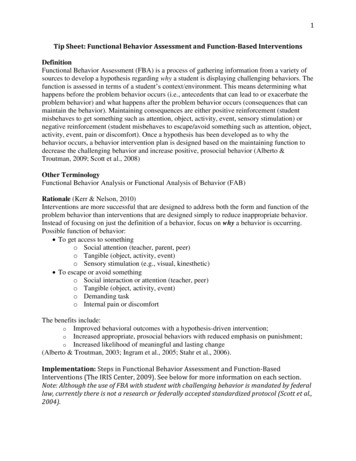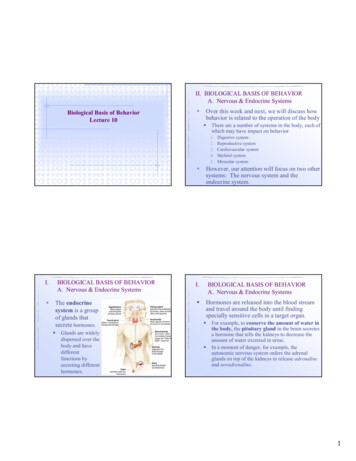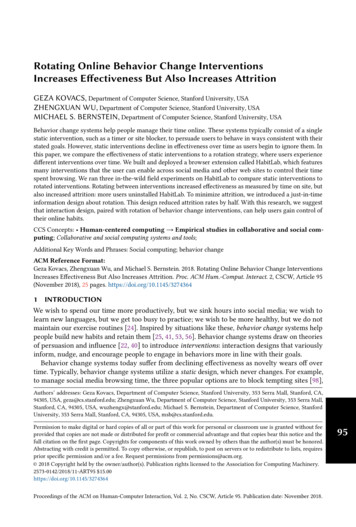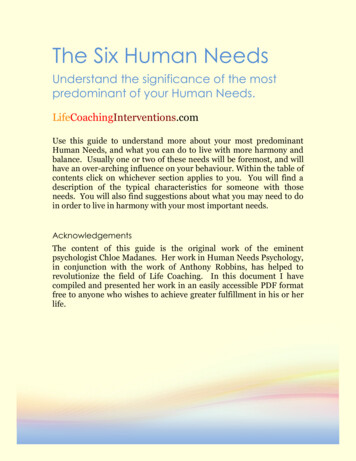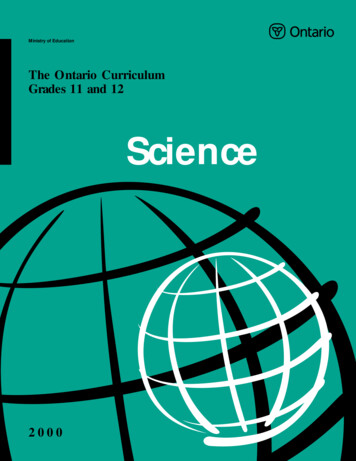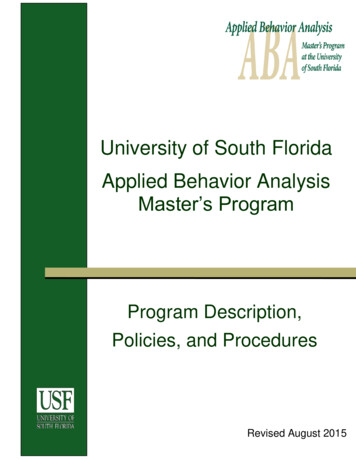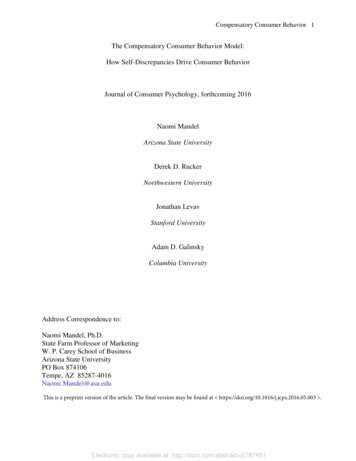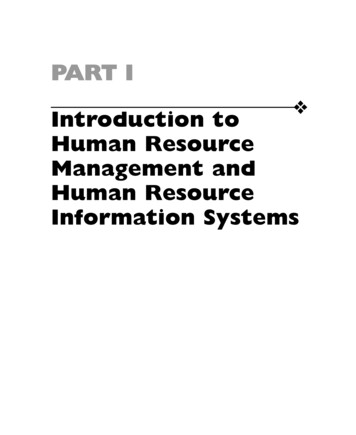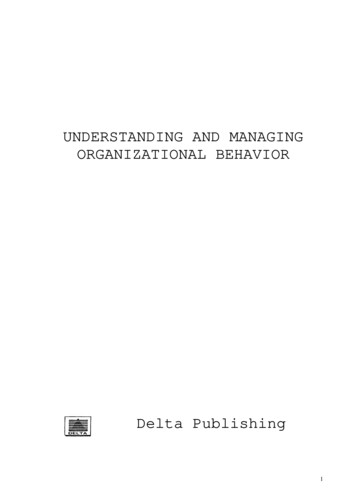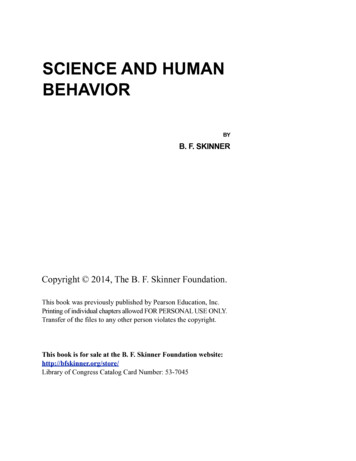
Transcription
SCIENCE AND HUMANBEHAVIORBYB. F. SKINNERCopyright 2014, The B. F. Skinner Foundation.This book was previously published by Pearson Education, Inc.Printing of individual chapters allowed FOR PERSONAL USE ONLY.Transfer of the files to any other person violates the copyright.This book is for sale at the B. F. Skinner Foundation website:http://bfskinner.org/store/Library of Congress Catalog Card Number: 53-7045
ToF. S. K E L L E R
ACKNOWLEDGMENTSThe quotation from Francesco Lana (Chapter I) was brought tothe attention of the readers of Science, August 25, 1939, by M. F.Ashley-Montagu. Permission to quote from George Bernard Shaw'sThe Adventures of the Black Girl in Her Search for God (ChapterIV) was kindly granted by the Society of Authors. The story aboutDean Briggs (Chapter XIV) was reported by Mary E. Woolley inthe American Scholar, Volume 1, Number 1, 1932. The quotationfrom Carl R. Rogers (Chapter XXIX) is to be found on page 212 ofthe Harvard Educational Review, Fall, 1948, and is used withpermission. I am indebted to J. G. Beebe-Center for a helpful readingof the manuscript. I am also grateful for editorial assistance from Mrs.Diana S. Larsen and Miss Dorothy Cohen.Harvard UniversityCambridge, MassachusettsB.F.S.
TABLE OF CONTENTSSECTION I: THE POSSIBILITY OF A SCIENCE OFHUMANBEHAVIORI. CAN SCIENCE HELP?II. A SCIENCE OF BEHAVIORIII. WHY ORGANISMSBEHAVE23311SECTION II: THE ANALYSIS OF BEHAVIORIV. REFLEXES AND CONDITIONED REFLEXESV. OPERANT BEHAVIORVI. SHAPING AND MAINTAININGOPERANT BEHAVIORVII. OPERANT DISCRIMINATIONVIII. THE CONTROLLING ENVIRONMENTIX. DEPRIVATION AND SATIATIONX. EMOTIONXI. AVERSION, AVOIDANCE, ANXIETYXII. PUNISHMENTXIII. FUNCTION VERSUS ASPECTXIV. THE ANALYSIS OF COMPLEX CASES455991107129141160171182194204SECTION III: THE INDIVIDUAL AS A WHOLEXV. "SELF-CONTROL"XVI. THINKINGXVII. PRIVATE EVENTS INA NATURAL SCIENCEXVIII. THE SELF227242257283ix
XTABLE OF CONTENTSSECTION IV: THE BEHAVIOR OF PEOPLE IN GROUPSXIX. SOCIAL BEHAVIORXX. PERSONAL CONTROLXXI. GROUP CONTROL297313323SECTION V: CONTROLLING AGENCIESXXII.XXIII.XXIV.XXV.XXVI.GOVERNMENT AND LAWRELIGIONPSYCHOTHERAPYECONOMIC CONTROLEDUCATION333350359384402SECTION VI-. THE CONTROL OF HUMAN BEHAVIORXXVII. CULTURE AND CONTROLXXVIII. DESIGNING A CULTUREXXIX. THE PROBLEM OF CONTROL415426437INDEX451
SECTIONITHE POSSIBILITY OFA SCIENCE OFHUMAN BEHAVIOR
CHAPTERICAN SCIENCE HELP?THE MISUSE OF SCIENCEBy the middle of the seventeenth century it had come to beunderstood that the world was enclosed in a sea of air, much as thegreater part of it was covered by water. A scientist of the period,Francesco Lana, contended that a lighter-than-air ship could floatupon this sea, and he suggested how such a ship might be built. Hewas unable to put his invention to a practical test, but he saw onlyone reason why it might not work:. . . that God will never suffer this Invention to take effect, becauseof the many consequencies which may disturb the CivilGovernment of men. For who sees not, that no City can be secureagainst attack, since our Ship may at any time be placed directlyover it, and descending down may discharge Souldiers; the samewould happen to private Houses, and Ships on the Sea: for our Shipdescending out of the Air to the sails of Sea-Ships, it may cut theirRopes, yea without descending by casting Grapples it may over-setthem, kill their men, burn their Ships by artificial Fire works andFire-balls. And this they may do not only to Ships but to greatBuildings, Castles, Cities, with such security that they which castthese things down from a height out of Gun-shot, cannot on theother side be offended by those below.3
4 THEPOSSIBILITY OF A SCIENCE OF HUMAN BEHAVIORLana's reservation was groundless. He had predicted modern airwarfare in surprisingly accurate detail—with its paratroopers and itsstrafing and bombing. Contrary to his expectation, God has sufferedhis invention to take effect.And so has Man. The story emphasizes the irresponsibility withwhich science and the products of science have been used. Man'spower appears to have increased out of all proportion to his wisdom.He has never been in a better position to build a healthy, happy, andproductive world; yet things have perhaps never seemed so black.Two exhausting world wars in a single half century have given noassurance of a lasting peace. Dreams of progress toward a highercivilization have been shattered by the spectacle of the murder ofmillions of innocent people. The worst may be still to come.Scientists may not set off a chain reaction to blow the world intoeternity, but some of the more plausible prospects are scarcely lessdisconcerting.In the face of this apparently unnecessary condition men of goodwill find themselves helpless or afraid to act. Some are the prey of aprofound pessimism. Others strike out blindly in counteraggression,much of which is directed toward science itself. Torn from itsposition of prestige, science is decried as a dangerous toy in the handsof children who do not understand it. The conspicuous feature ofany period is likely to be blamed for its troubles, and in thetwentieth century science must play the scapegoat. But the attack isnot entirely without justification. Science has developed unevenly.By seizing upon the easier problems first, it has extended our controlof inanimate nature without preparing for the serious social problemswhich follow. The technologies based upon science are disturbing.Isolated groups of relatively stable people are brought into contactwith each other and lose their equilibrium. Industries spring up forwhich the life of a community may be unprepared, while othersvanish leaving millions unfit for productive work. The application ofscience prevents famines and plagues, and lowers death rates—only topopulate the earth beyond the reach of established systems ofcultural or governmental control. Science has made war more terribleand more destructive. Much of this has not been done deliberately,but it has
CAN SCIENCE HELP?5been done. And since scientists are necessarily men of someintelligence, they might have been expected to be alert to theseconsequences.It is not surprising to encounter the proposal that science shouldbe abandoned, at least for the time being. This solution appealsespecially to those who are fitted by temperament to other ways oflife. Some relief might be obtained if we could divert mankindinto a revival of the arts or religion or even of that petty quarrelingwhich we now look back upon as a life of peace. Such a programresembles the decision of the citizens of Samuel Butler's Erewhon,where the instruments and products of science were put intomuseums—as vestiges of a stage in the evolution of humanculture which did not survive. But not everyone is willing todefend a position of stubborn "not knowing." There is no virtue inignorance for its own sake. Unfortunately we cannot stand still: tobring scientific research to an end now would mean a return tofamine and pestilence and the exhausting labors of a slave culture.SCIENCE AS A CORRECTIVEAnother solution is more appealing to the modern mind. It maynot be science which is wrong but only its application. The methodsof science have been enormously successful wherever they have beentried. Let us then apply them to human affairs. We need not retreat inthose sectors where science has already advanced. It is necessaryonly to bring our understanding of human nature up to the samepoint. Indeed, this may well be our only hope. If we can observe'human behavior carefully from an objective point of view and cometo understand it for what it is, we may be able to adopt a. moresensible course of action. The need for establishing some suchbalance is now widely felt, and those who are able to control thedirection of science are acting accordingly. It is understood that thereis no point in furthering a science of nature unless it includes asizable science of human nature, because only in that case will theresults be wisely used. It is possible that science has come to therescue and that order will eventually be achieved in the field of humanaffairs.
6THE POSSIBILITY OF A SCIENCE OF HUMAN BEHAVIORTHE THREAT TO FREEDOMThere is one difficulty, however. The application of science tohuman behavior is not so simple as it seems. Most of those whoadvocate it are simply looking for "the facts." To them science islittle more than careful observation. They want to evaluate humanbehavior as it really is rather than as it appears to be throughignorance or prejudice, and then to make effective decisions and moveon rapidly to a happier world. But the way in which science hasbeen applied in other fields shows that something more is involved.Science is not concerned just with "getting the facts," after whichone may act with greater wisdom in an unscientific fashion. Sciencesupplies its own wisdom. It leads to a new conception of a subjectmatter, a new way of thinking about that part of the world to whichit has addressed itself. If we are to enjoy the advantages of sciencein the field of human affairs, we must be prepared to adopt theworking model of behavior to which a science will inevitably lead.But very few of those who advocate the application of scientificmethod to current problems are willing to go that far.Science is more than the mere description of events as they occur. Itis an attempt to discover order, to show that certain events stand inlawful relations to other events. No practical technology can bebased upon science until such relations have been discovered. Butorder is not only a possible end product; it is a working assumptionwhich must be adopted at the very start. We cannot apply the methodsof science to a subject matter which is assumed to move aboutcapriciously. Science not only describes, it predicts. It deals not onlywith the past but with the future. Nor is prediction the last word: tothe extent that relevant conditions can be altered, or otherwisecontrolled, the future can be controlled. If we are to use the methodsof science in the field of human affairs, we must assume that behavioris lawful and determined. We must expect to discover that what aman does is the result of specifiable conditions and that once theseconditions have been discovered, we can anticipate and to someextent determine his actions.This possibility is offensive to many people. It is opposed to a tra-
CAN SCIENCE HELP?7dition of long standing which regards man as a free agent, whosebehavior is the product, not of specifiable antecedent conditions, butof spontaneous inner changes of course. Prevailing philosophies ofhuman nature recognize an internal "will" which has the power ofinterfering with causal relationships and which makes the predictionand control of behavior impossible. To suggest that we abandon thisview is to threaten many cherished beliefs—to undermine whatappears to be a stimulating and productive conception of humannature. The alternative point of view insists upon recognizing coerciveforces in human conduct which we may prefer to disregard. Itchallenges our aspirations, either worldly or otherworldly.Regardless of how much we stand to gain from supposing thathuman behavior is the proper subject matter of a science, no onewho is a product of Western civilization can do so without astruggle. We simply do not want such a science.Conflicts of this sort are not unknown in the history of science.When Aesop's lion was shown a painting in which a man wasdepicted killing a lion, he commented contemptuously, "The artistwas obviously a man." Primitive beliefs about man and his place innature are usually flattering. It has been the unfortunateresponsibility of science to paint more realistic pictures. TheCopernican theory of the solar system displaced man from his preeminent position at the center of things. Today we accept thistheory without emotion, but originally it met with enormousresistance. Darwin challenged a practice of segregation in which manset himself firmly apart from the animals, and the bitter strugglewhich arose is not yet ended. But though Darwin put man in hisbiological place, he did not deny him a possible position as master.Special faculties or a special capacity for spontaneous, creative actionmight have emerged in the process of evolution. When that distinctionis now questioned, a new threat arises.There are many ways of hedging on the theoretical issue. It may beinsisted that a science of human behavior is impossible, that behaviorhas certain essential features which forever keep it beyond the paleof science. But although this argument may dissuade many peoplefrom further inquiry, it is not likely to have any effect upon those
8THE POSSIBILITY OF A SCIENCE OF HUMAN BEHAVIORwho are willing to try and see. Another objection frequently offeredis that science is appropriate up to a certain point, but that theremust always remain an area in which one can act only on faith orwith respect to a "value judgment": science may tell us how to dealwith human behavior, but just what is to be done must be decided inan essentially nonscientific way. Or it may be argued that there isanother kind of science which is compatible with doctrines ofpersonal freedom. For example, the social sciences are sometimes saidto be fundamentally different from the natural sciences and notconcerned with the same kinds of lawfulness. Prediction andcontrol may be forsworn in favor of "interpretation" or some otherspecies of understanding. But the kinds of intellectual activitiesexemplified by value judgments or by intuition or interpretation havenever been set forth clearly, nor have they yet shown any capacityto work a change in our present predicament.THE PRACTICAL ISSUEOur current practices do not represent any well-defined theoreticalposition. They are, in fact, thoroughly confused. At times we appearto regard a man's behavior as spontaneous and responsible. At othertimes we recognize that inner determination is at least not complete,that the individual is not always to be held to account. We have notbeen able to reject the slowly accumulating evidence thatcircumstances beyond the individual are relevant. We sometimesexonerate a man by pointing to "extenuating circumstances." Weno longer blame the uneducated for their ignorance or call theunemployed lazy. We no longer hold children wholly accountablefor their delinquencies. "Ignorance of the law" is no longer whollyinexcusable: "Father, forgive them; for they know not what they do."The insane have long since been cleared of responsibility for theircondition, and the kinds of neurotic or psychotic behavior to whichwe now apply this extenuation are multiplying.But we have not gone all the way. We regard the common man asthe product of his environment; yet we reserve the right to givepersonal credit to great men for their achievements. (At the sametime we take a certain delight in proving that part of the output of
CAN SCIENCE HELP?9even such men is due to the "influence" of other men or to sometrivial circumstance in their personal history.) We want to believethat right-minded men are moved by valid principles even thoughwe are willing to regard wrong-minded men as victims oferroneous propaganda. Backward peoples may be the fault of a poorculture, but we want to regard the elite as something more than theproduct of a good culture. Though we observe that Moslemchildren in general become Moslems while Christian children ingeneral become Christians, we are not willing to accept anaccident of birth as a basis for belief. We dismiss those whodisagree with us as victims of ignorance, but we regard thepromotion of our own religious beliefs as something more thanthe arrangement of a particular environment.All of this suggests that we are in transition. We have not whollyabandoned the traditional philosophy of human nature; at the sametime we are far from adopting a scientific point of view withoutreservation. We have accepted the assumption of determinism inpart; yet we allow our sympathies, our first allegiances, and ourpersonal aspirations to rise to the defense of the traditional view.We are currently engaged in a sort of patchwork in which newfacts and methods are assembled in accordance with traditionaltheories.If this were a theoretical issue only, we would have no cause foralarm; but theories affect practices. A scientific conception ofhuman behavior dictates one practice, a philosophy of personalfreedom another. Confusion in theory means confusion in practice.The present unhappy condition of the world may in large measurebe traced to our vacillation. The principal issues in disputebetween nations, both in peaceful assembly and on the battlefield,are intimately concerned with the problem of human freedom andcontrol. Totalitarianism or democracy, the state or the individual,planned society or laissez-faire, the impression of cultures uponalien peoples, economic determinism, individual initiative,propaganda, education, ideological warfare—all concern thefundamental nature of human behavior. We shall almost certainlyremain ineffective in solving these problems until we adopt aconsistent point of view.We cannot really evaluate the issue until we understand thealternatives. The traditional view of human nature in Westernculture
10THE POSSIBILITY OF A SCIENCE OF HUMAN BEHAVIORis well known. The conception of a free, responsible individual isembedded in our language and pervades our practices, codes, andbeliefs. Given an example of human behavior, most people candescribe it immediately in terms of such a conception. The practiceis so natural that it is seldom examined. A scientific formulation, onthe other hand, is new and strange. Very few people have any notionof the extent to which a science of human behavior is indeedpossible. In what way can the behavior of the individual or of groupsof individuals be predicted and controlled? What are laws of behaviorlike? What over-all conception of the human organism as a behavingsystem emerges? It is only when we have answered these questions,at least in a preliminary fashion, that we may consider theimplications of a science of human behavior with respect to either atheory of human nature or the management of human affairs.
CHAPTERIIA SCIENCE OF BEHAVIORThe immediate tangible results of science make iteasier to appraise than philosophy, poetry, art, or theology. AsGeorge Sarton has pointed out, science is unique in showing acumulative progress. Newton explained his tremendousachievements by saying that he stood on the shoulders ofgiants. All scientists, whether giants or not, enable those whofollow them to begin a little further along. This is notnecessarily true elsewhere. Our contemporary writers, artists,and philosophers are not appreciably more effective than thoseof the golden age of Greece, yet the average high-schoolstudent understands much more of nature than the greatestof Greek scientists. A comparison of the effectiveness ofGreek and modern science is scarcely worth making.It is clear, then, that science "has something." It is aunique intellectual process which yields remarkable results.The danger is that its astonishing accomplishments mayconceal its true nature. This is especially important when weextend the methods of science to a new field. The basiccharacteristics of science are not restricted to any particularsubject matter. When we study physics, chemistry, or biology,we study organized accumulations of information. These arenot science itself but the products of science. We may not beable11
12THE POSSIBILITY OF A SCIENCE OF HUMAN BEHAVIORto use much of this material when we enter new territory.Nor should we allow ourselves to become enamored ofinstruments of research. We tend to think of the scientist inhis observatory or laboratory, with his telescopes,microscopes, and cyclotrons. Instruments give us a dramaticpicture of science in action. But although science could nothave gone very far without the devices which improve ourcontact with the surrounding world, and although anyadvanced science would be helpless without them, they arenot science itself. We should not be disturbed if familiarinstruments are lacking in a new field. Nor is science to beidentified with precise measurement or mathematicalcalculation. It is better to be exact than inexact, and much ofmodern science would be impossible without quantitativeobservations and without the mathematical tools needed toconvert its reports into more general statements; but we maymeasure or be mathematical without being scientific at all,just as we may be scientific in an elementary way withoutthese aids.SOME IMPORTANT CHARACTERISTICS OF SCIENCEScience is first of all a set of attitudes. It is a disposition todeal with the facts rather than with what someone has saidabout them. Rejection of authority was the theme of therevival of learning, when men dedicated themselves to thestudy of "nature, not books." Science rejects even its ownauthorities when they interfere with the observation ofnature.Science is a willingness to accept facts even when they areopposed to wishes. Thoughtful men have perhaps alwaysknown that we are likely to see things as we want to seethem instead of as they are, but thanks to Sigmund Freud weare today much more clearly aware of "wishful thinking."The opposite of wishful thinking is intellectual honesty—anextremely important possession of the successful scientist.Scientists are by nature no more honest than other men but,as Bridgman has pointed out, the practice of science puts anexceptionally high premium on honesty. It is characteristicof science that any lack of honesty quickly brings disaster.Consider, for example, a scientist who conducts research totest a theory for which he is
A SCIENCE OF BEHAVIOR13already well known. The result may confirm his theory,contradict it, or leave it in doubt. In spite of any inclinationto the contrary, he must report a contradiction just as readilyas a confirmation. If he does not, someone else will—in amatter of weeks or months or at most a few years—and thiswill be more damaging to his prestige than if he himself hadreported it. Where right and wrong are not so easily or soquickly established, there is no similar pressure. In the longrun, the issue is not so much one of personal prestige as ofeffective procedure. Scientists have simply found that beinghonest —with oneself as much as with others—is essentialto progress. Experiments do not always come out as oneexpects, but the facts must stand and the expectations fall.The subject matter, not the scientist, knows best. The samepractical consequences have created the scientificatmosphere in which statements are constantly submitted tocheck, where nothing is put above a precise description ofthe facts, and where facts are accepted no matter howdistasteful their momentary consequences.Scientists have also discovered the value of remainingwithout an answer until a satisfactory one can be found.This is a difficult lesson. It takes considerable training toavoid premature conclusions, to refrain from makingstatements on insufficient evidence, and to avoidexplanations which are pure invention. Yet the history ofscience has demonstrated again and again the advantage ofthese practices.Science is, of course, more than a set of attitudes. It is asearch for order, for uniformities, for lawful relations amongthe events in nature. It begins, as we all begin, by observingsingle episodes, but it quickly passes on to the general rule,to scientific law. Something very much like the orderexpressed in a scientific law appears in our behavior at anearly age. We learn the rough geometry of the space inwhich we move. We learn the "laws of motion" as we moveabout, or push and pull objects, or throw and catch them. Ifwe could not find some uniformity in the world, our conductwould remain haphazard and ineffective. Science sharpensand supplements this experience by demonstrating more andmore relations among events and by demonstrating themmore and more precisely. As Ernst Mach
14THE POSSIBILITY OF A SCIENCE OF HUMAN BEHAVIORshowed in tracing the history of the science of mechanics,the earliest laws of science were probably the rules used bycraftsmen and artisans in training apprentices. The rulessaved time because the experienced craftsman could teach anapprentice a variety of details in a single formula. Bylearning a rule the apprentice could deal with particularcases as they arose.In a later stage science advances from the collection ofrules or laws to larger systematic arrangements. Not onlydoes it make statements about the world, it makesstatements about statements. It sets up a "model" of itssubject matter, which helps to generate new rules very muchas the rules themselves generate new practices in dealingwith single cases. A science may not reach this stage forsome time.The scientific "system," like the law, is designed to enableus to handle a subject matter more efficiently. What we callthe scientific conception of a thing is not passiveknowledge. Science is not concerned with contemplation.When we have discovered the laws which govern a part ofthe world about us, and when we have organized these lawsinto a system, we are then ready to deal effectively with thatpart of the world. By predicting the occurrence of an eventwe are able to prepare for it. By arranging conditions inways specified by the laws of a system, we not only predict,we control: we "cause" an event to occur or to assumecertain characteristics.BEHAVIOR AS A SCIENTIFIC SUBJECT MATTERBehavior is not one of those subject matters whichbecome accessible only with the invention of an instrumentsuch as the telescope or microscope. We all know thousandsof facts about behavior. Actually there is no subject matterwith which we could be better acquainted, for we are alwaysin the presence of at least one behaving organism. But thisfamiliarity is something of a disadvantage, for it means thatwe have probably jumped to conclusions which will not besupported by the cautious methods of science. Even thoughwe have observed behavior for many years, we are notnecessarily able, without help, to express useful uniformitiesor lawful relations. We may show considerable skill inmaking plausible guesses about what
A SCIENCE OF BEHAVIOR15our friends and acquaintances will do under variouscircumstances or what we ourselves will do. We may makeplausible generalizations about the conduct of people ingeneral. But very few of these will survive careful analysis.A great deal of unlearning generally takes place in our earlycontact with a science of behavior.Behavior is a difficult subject matter, not because it isinaccessible, but because it is extremely complex. Since it isa process, rather than a thing, it cannot easily be held stillfor observation. It is changing, fluid, and evanescent, andfor this reason it makes great technical demands upon theingenuity and energy of the scientist. But there is nothingessentially insoluble about the problems which arise fromthis fact.Several kinds of statements about behavior are commonlymade. When we tell an anecdote or pass along a bit ofgossip, we report a single event—what someone did uponsuch and such an occasion: "She slammed the door andwalked off without a word." Our report is a small bit ofhistory. History itself is often nothing more than similarreporting on a broad scale. The biographer often confineshimself to a series of episodes in the life of his subject. Thecase history, which occupies an important place in severalfields of psychology, is a kind of biography which is alsoconcerned mainly with what a particular person did atparticular times and places: "When she was eleven, Marywent to live with her maiden aunt in Winchester." Novelsand short stories may be thought of as veiled biography orhistory, since the ingredients of even a highly fanciful workof fiction are somehow or other taken from life. The narrativereporting of the behavior of people at particular times andplaces is also part of the sciences of archeology, ethnology,sociology, and anthropology.These accounts have their uses. They broaden theexperience of those who have not had firsthand access tosimilar data. But they are only the beginnings of a science.No matter how accurate or quantitative it may be, the reportof the single case is only a preliminary step. The next step isthe discovery of some sort of uniformity. When we tell ananecdote to support an argument, or report a case history toexemplify a principle, we imply a general rule, no matterhow
16THE POSSIBILITY OF A SCIENCE OF HUMAN BEHAVIORvaguely it may be expressed. The historian is seldomcontent with mere narration. He reports his facts to supporta theory—of cycles, trends, or patterns of history. In doingso he passes from the single' instance to the rule. When abiographer traces the influence of an early event upon aman's later life, he transcends simple reporting and asserts,no matter how hesitantly, that one thing has caused another.Fable and allegory are more than storytelling if they implysome kind of uniformity in human behavior, as theygenerally do. Our preference for "consistency of character"and our rejection of implausible coincidences in literatureshow that we expect lawfulness. The "manners" and"customs" of the sociologist and anthropologist report thegeneral behavior of groups of people.A vague sense of order emerges from any sustainedobservation of human behavior. Any plausible guess aboutwhat a friend will do or say in a given circumstance is aprediction based upon some such uniformity. If a reasonableorder was not discoverable, we could scarcely be effectivein dealing with human affairs. The methods of science aredesigned to clarify these uniformities and make themexplicit. The techniques of field study of the anthropologistand social psychologist, the procedures of the psyc
SCIENCE AS A CORRECTIVE Another solution is more appealing to the modern mind. It may not be science which is wrong but only its application. The methods of science have been enormously successful wherever they have been tried. Let us then apply them to human affairs. We need not retreat in those sec
